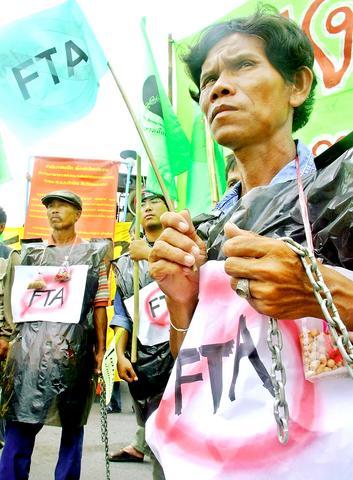Prime Minister Thaksin Shinawatra admitted corruption within government ranks but dismissed "babbling" critics who claimed graft had reached new highs, a newspaper reported yesterday.
Thaksin said he would tackle corruption within junior ranks of government if he won a second term in elections expected early next year, but dismissed claims by a former premier that the problem had reached a historic high.
Anand Panyarachun told a seminar last weekend that corruption was becoming so widespread that it could ruin the country.

PHOTO: EPA
Thaksin, who ran a huge business empire before becoming prime minister, turned on his detractors who accused his administration of being implicated in a series of conflicts of interest.
"They just kept babbling away and since the election is nearer more of them will come out of the woodwork and will lash out at me whenever a microphone is put before their mouths," Thaksin was quoted as saying in The Nation.
Thaksin said he would focus on police and corruption within the civil service if he won re-election. "Their welfare will be looked after and loopholes for corruption will be dealt with."
Thaksin has launched a war on corruption and announced a six-year goal to stamp out so-called "dark forces," a move that his opponents dismissed as a publicity stunt.
Thailand's revered monarch King Bhumibol Adulyadej earlier this year called on the public to stamp out corruption within a decade following concerns over the effect it could have on the fast-expanding economy.
Corruption has been part of Thai life for decades but critics say there has been no concerted attempt to stamp out bribery, extortion and the sale of political positions.
Nine out of ten Thais believe corruption is rampant at the national level of politics, according to a survey by the National Economic and Social Advisory Council now headed by Anand, twice briefly premier in the 1990s.
A survey of foreign businessmen by a Hong Kong-based consultancy this year found they believed corruption in Thailand was less widespread than in countries such as Indonesia, Vietnam and India but worse than South Korea, Taiwan and Hong Kong.

A fire caused by a burst gas pipe yesterday spread to several homes and sent a fireball soaring into the sky outside Malaysia’s largest city, injuring more than 100 people. The towering inferno near a gas station in Putra Heights outside Kuala Lumpur was visible for kilometers and lasted for several hours. It happened during a public holiday as Muslims, who are the majority in Malaysia, celebrate the second day of Eid al-Fitr. National oil company Petronas said the fire started at one of its gas pipelines at 8:10am and the affected pipeline was later isolated. Disaster management officials said shutting the

US Vice President J.D. Vance on Friday accused Denmark of not having done enough to protect Greenland, when he visited the strategically placed and resource-rich Danish territory coveted by US President Donald Trump. Vance made his comment during a trip to the Pituffik Space Base in northwestern Greenland, a visit viewed by Copenhagen and Nuuk as a provocation. “Our message to Denmark is very simple: You have not done a good job by the people of Greenland,” Vance told a news conference. “You have under-invested in the people of Greenland, and you have under-invested in the security architecture of this

Japan unveiled a plan on Thursday to evacuate around 120,000 residents and tourists from its southern islets near Taiwan within six days in the event of an “emergency”. The plan was put together as “the security situation surrounding our nation grows severe” and with an “emergency” in mind, the government’s crisis management office said. Exactly what that emergency might be was left unspecified in the plan but it envisages the evacuation of around 120,000 people in five Japanese islets close to Taiwan. China claims Taiwan as part of its territory and has stepped up military pressure in recent years, including

UNREST: The authorities in Turkey arrested 13 Turkish journalists in five days, deported a BBC correspondent and on Thursday arrested a reporter from Sweden Waving flags and chanting slogans, many hundreds of thousands of anti-government demonstrators on Saturday rallied in Istanbul, Turkey, in defence of democracy after the arrest of Istanbul Mayor Ekrem Imamoglu which sparked Turkey’s worst street unrest in more than a decade. Under a cloudless blue sky, vast crowds gathered in Maltepe on the Asian side of Turkey’s biggest city on the eve of the Eid al-Fitr celebration which started yesterday, marking the end of Ramadan. Ozgur Ozel, chairman of the main opposition Republican People’s Party (CHP), which organized the rally, said there were 2.2 million people in the crowd, but